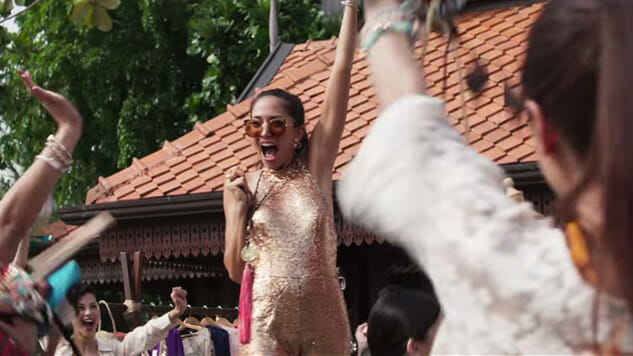Crazy Rich Asians

Chinese-American professor of economics Rachel Chu (Constance Wu) is Chinese-American, and the adaptation of Kevin Kwan’s best-selling book Crazy Rich Asians starkly makes that point, repeatedly. Rachel’s college best friend Peik Lin (an ebullient Awkwafina) calls her a “banana”: “Yellow on the outside, white on the inside,” and attaches a superlative when she says this. Her mother (Tan Kheng Hua), on the occasion of finding out Rachel will be traveling to Singapore to meet her hunky boyfriend’s family, tells her a somewhat uncomfortable truth: “You are Chinese, you speak Mandarin, but in here,” she says, pointing to Rachel’s heart, “You are American.”
It is a bittersweet, but rather perceptive observation, one that finely articulates a compounded sense of otherness Rachel feels throughout the film, particularly once the plot gets rolling and Rachel realizes that her debonair Nick Young (Henry Golding) is the son of an obscenely wealthy Singaporean family who leans heavily on traditional Chinese family values and matriarchy. She is middle class, raised by a single mother and, as everyone has been quick to point out, Chinese-American.
Crazy Rich Asians is fairly impressive in its subtle subtext about Chinese—or, more broadly, East Asian—diaspora in the United States, as if the prickly, arch accusations of being “not Asian enough” heavily inform the emotional currents in the film. Compounding Rachel’s culture shock, as she comes to encounter an extreme amount of affluence in Singapore, is the internal dialogue she seems to be having with herself about what kind of life she wants, revealing her relationship to class. Crazy Rich Asians’ selling point is certainly a kind of affluence porn, and its attempt to critique that kind of wealth is probably where the film is weakest, but the way director John M. Chu recontextualizes a The Prince & Me story to lend more cultural texture to outsiderness is fascinating. What would it mean for Rachel to buy into this world, when it is implied that everywhere she walks she exists in a space where she is not enough?
-

-

-

-

-

-

-

-

-

-

-

-

-

-

-

-

-

-

-

-

-

-

-

-

-

-

-

-

-

-

-

-

-

-

-

-

-

-

-

-








































